Shopify is one of the most popular ecommerce platforms on the internet today.
However, there are some downsides to using it if you’re selling goods, which is why you might be searching for Shopify alternatives.
No matter what your reasons for wanting another option, there are sites like Shopify that allow you to sell your products to millions of customers around the world.
Let’s dive in!
1. Squarespace

Squarespace is a site that allows you to build your own website to sell stuff.
It’s a great ecommerce platform that many people and companies use to power their online selling.
They offer a nice selection of templates that you can use to build your site with ease.
Pros:
- Simple to Create – Very easy to create your site
- Design Choices – Impressive packages that make your site look good
- No Added Fees No added transaction fees
Cons:
- Too Simple – Not a lot of options for add ons
- No Support – Need to do much of the setup on your own
- Limited Processors – Only accept Stripe and PayPal
Pricing: You will get the Squarespace basics for $26 each month. This includes a free domain name, SSL security, unlimited pages and blogs, as well as checkout.
You can upgrade to the $40 per-month package and get gift cards, carrier shipping in real time and other feature.
Who is this platform perfect for? Of all the websites like Shopify, Squarespace is the perfect fit for stores with not a complex offering of products. It’s also great for people who know what they’re doing design wise.
Check out these best items to resell for profit to give you some ideas for your site.
Tactic for Success
If you’re going to go with Squarespace, know that you’ll need to have either PayPal or Stripe to accept payments. A good first step, then, would be to make sure you have your accounts there set up and verified. That way, you can roll out your page right away and start accepting payments for orders.
2. BigCommerce

This open ecommerce platform allows all types of businesses to create their own online store. It was founded back in 2009 and is very flexible.
This site’s strongpoint is the ability to allow ecommerce sites to grow over time, which is key if you practice retail arbitrage and plan to expand your scope of goods.
Pros:
- Payment Gateways – More than 55 gateways supported
- Easy to Create – No knowledge of coding is needed to create a site
- SEO Tools – Great SEO, including URLs that can be customized
Cons:
- Limited Themes – Only five themes are offered for free
- Too Many Features – Lots of features that you have to learn
- Expensive to Buy – Especially for stores that sell a lot
Pricing: The pricing for BigCommerce starts at $29.95 per month. However, that can go all the way up to $249.95 per month. If your site sells in excess of $50,000 per year, then you have to have the top plan.
Who is this platform perfect for? BigCommerce is great for stores that want an easy solution to creating an ecommerce store with many options. It’s especially good for businesses that need to upgrade their SEO.
Trend on the Rise
There are more than 50,000 live websites that use BigCommerce in the United States alone. That’s an awful lot of sites that trust them with their ecommerce. So, if you’re considering this platform, know that plenty of others already use it.
3. WooCommerce
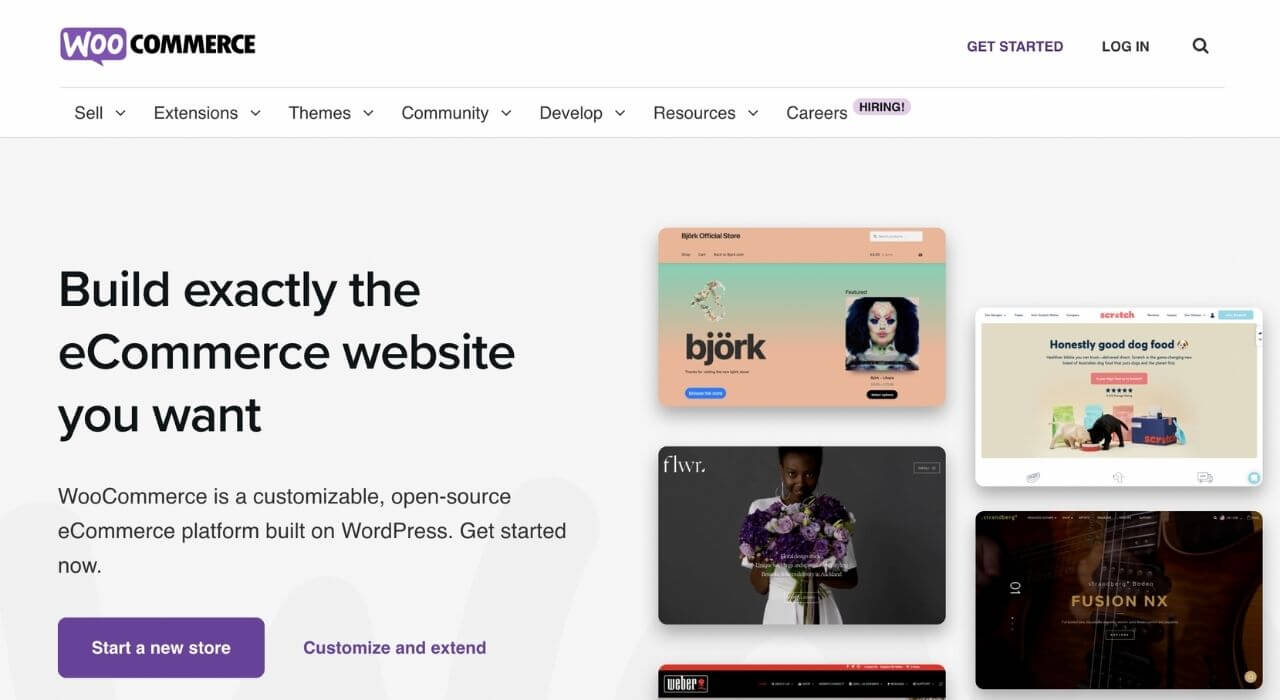
This site started in 2011 as a way for people to take their WordPress sites and convert them to ecommerce sites.
Because of this, familiarity with WordPress makes it very easy to transition to this platform.
They have a great extension that you can add right to your WordPress site to integrate it into an ecommerce site, making this a great option.
Pros:
- Free to Use – No charge to download or use the plugin
- Easy to Use – Very easy to integrate the plugin with your WordPress site
- Very Customizable – Open source allows you to customize your code completely
Cons:
- Extras Cost Money – Finding and paying for domain, hosting, SSL certificate, etc. are on you
- Coding Required – Will take some coding and developing to set up properly
- Complex to Understand – Reliance on plugins can be complex and slow down the site
Pricing: One of the best parts about WooCommerce is that, in and of itself, it’s free. All you have to do is search for the plugin, download it and integrate it into your existing WordPress site.
However, like mentioned, you’ll need to pay for costly things such as your domain name, hosting, SSL certificate, emails and more.
Who is this platform perfect for? WooCommerce is great for people who are very familiar with WordPress and have no issue doing a little coding.
It’s a nice and easy way to take your existing site and add ecommerce functionality.
Tactic for Success
If you’re considering using WooCommerce, you will obviously need to have your website set up on WordPress. This doesn’t mean that you need to do that first, as it can be done at the same time. If you want to use it, make sure you’re set on WordPress as your website hosting.
Trend on the Rise
No matter what platform you choose for your ecommerce store, know that there are some things that work and some that don’t. In terms of design, having recognizable icons for things such as social media links and a phone number help visitors to your page. So, consider using some of these in your design.
4. Zyro
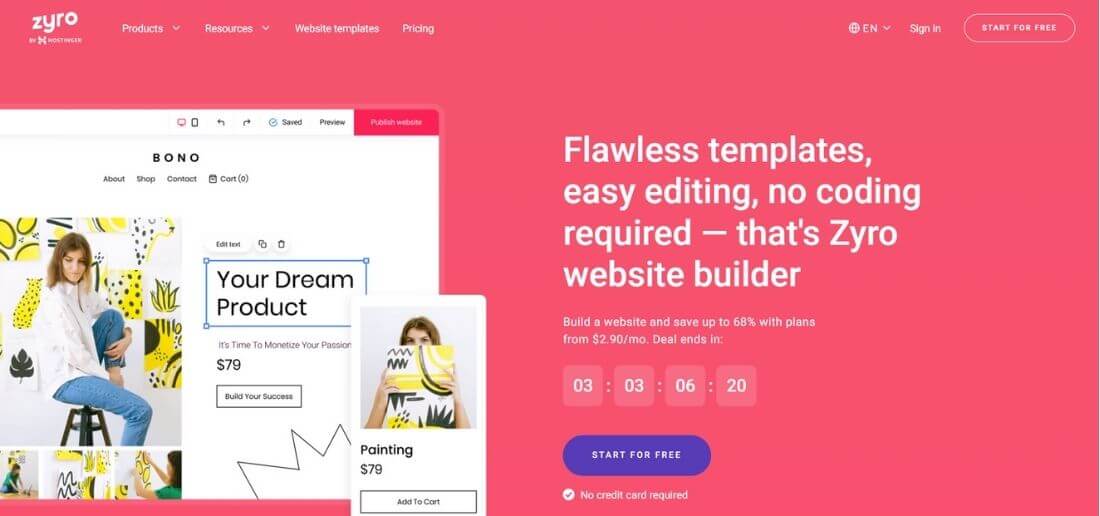
You can build your page on Zyro with drag-and-drop tools that make it very easy to get started.
In fact, it’s very similar to Shopify in this regard, making it one of the better Shopify alternatives.
You can also integrate marketing, dropshipping and even print on demand features right in with it.
On the flip side, if you’re curious if selling on Etsy is worth it, this could be a viable option to look into if dropshipping is your focus.
Pros:
- Free Trial – Can get your money back within 30 days if you’re not satisfied
- Blogging Abilities – Built-in features allow you to blog so you can market your store
- Multiple Languages Supported – Supports multiple languages so you can sell around the globe
Cons:
- Product Limits – Limits exist for products you can sell
- Slow to Load – Sites often load and operate slowly on mobile devices
- Features Available on Higher Tiers – Some of the best features, such as multi-channel selling only available on advanced plans
Pricing: This is a pretty affordable option, since the basic Zyro plan starts at $5 per month. The highest tier of pricing is also only $15.90 per month. Their Advanced Store choice offers the most features and functionality.
Who is this platform perfect for?If you’re looking for an affordable alternative to Shopify, Zyro is a pretty solid option. It’s very easy to create ecommerce pages here and get started selling online.
5. Sellfy
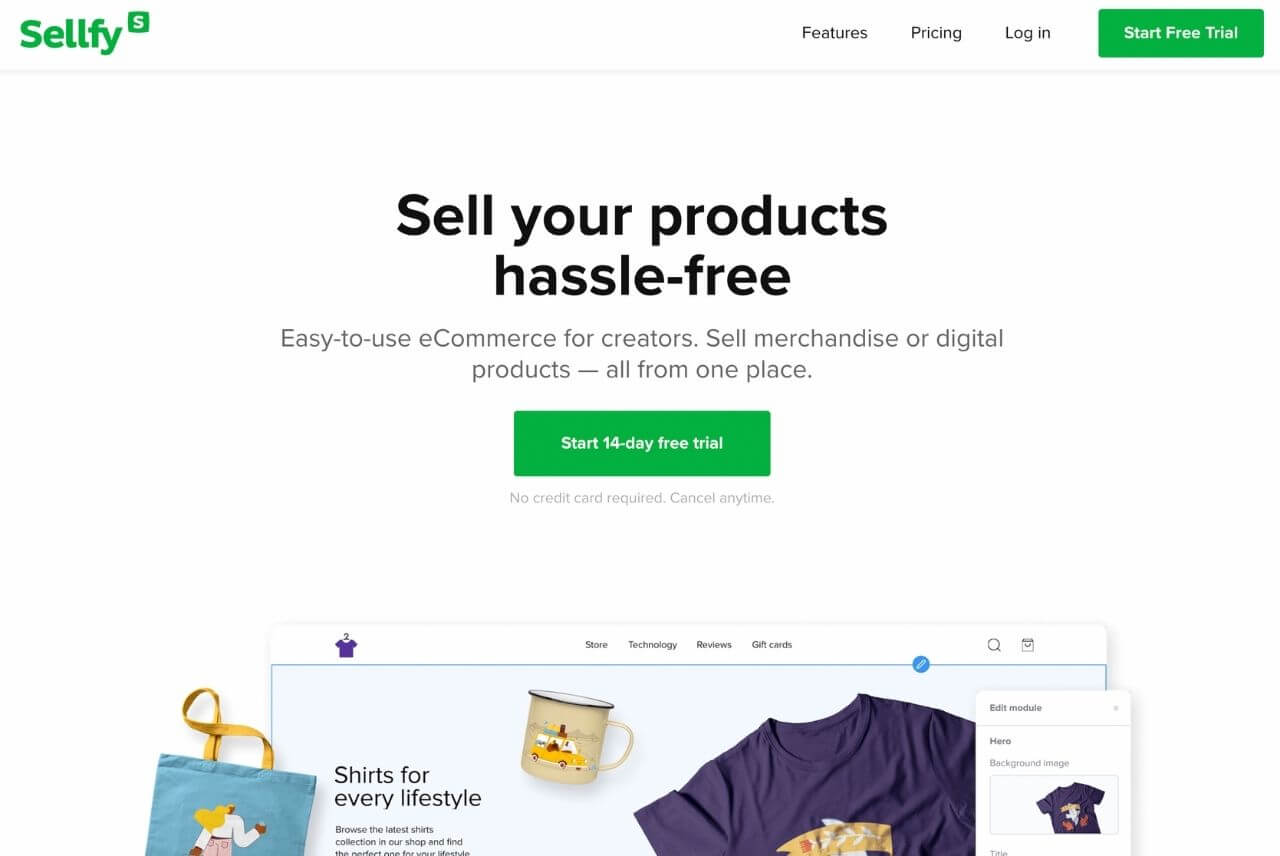
This platform is geared specifically to the sale of digital products. If you sell courses, art and/or music, to name a few, this is the site for you.
There are different options and features to the site that make it pretty attractive, too.
Pros:
- Easy to Set Up – Takes no time and no effort to set up your site
- Multiple Options – Can sell digital products, too, which you can’t do on other platforms
- Integrates with Apps – Integrates directly to Wix, which is great if your site is on there
Cons:
- Payment Choices – Must have either Stripe or PayPal to accept payments
- Design Limits – Not a lot of options to choose from
- Pricey Service – For what is offered, it’s quite expensive
Pricing: All plans come with a free trial of 14 days. The plans range from $29 per month to $129 per month, and you can get a discount by paying annually. There’s also a cheap option to just add buttons to a website you already have.
Who is this platform perfect for? Sellfy is the perfect fit for artists and creative people who sell digital products. Their features and functionality really stand out among that crowd.
6. Wix
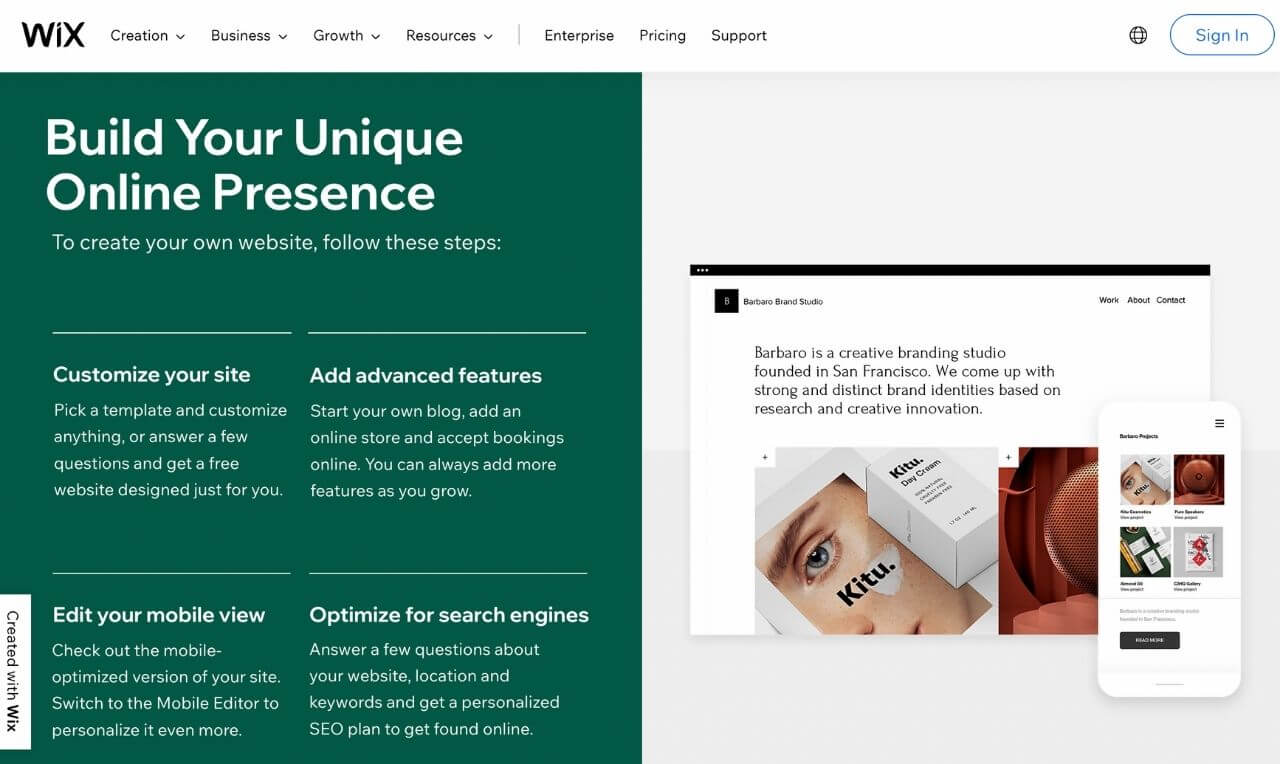
Wix is a lot like WordPress, in that people use it to create websites of all different kinds.
There are many different add-ons that they offer, including apps, plugins, payment gateways and even coupons. You can embed HTML coding right into your site as well.
Pros:
- Many Features – Lots of great features offered through app store
- Templates to Choose From – Don’t have to create anything from scratch
- Free Options – Don’t have to pay if you don’t mind Wix branding
Cons:
- Traffic Limits – They set limits on both traffic and bandwidth
- SEO on Your Own – Have to set up SEO on your own, as it’s not built in
- Familiarity Required – Need to be familiar with Wix or have a steep learning curve
Pricing: The $5-per-month plan allows you to use a custom domain, which is a very popular feature for businesses. It also provides 500MB of storage and 1GB of bandwidth.
You can upgrade to other packages for either $16.50 per month or $24.50 per month, depending on what features you need and/or want.
Who is this platform perfect for? Wix is great for businesses that want an alternative to WordPress, in that they need to integrate more than just an ecommerce store.
It’s a solid option for a business that wants to be more well-rounded than just listing their products for sale online.
7. Shift4Shop
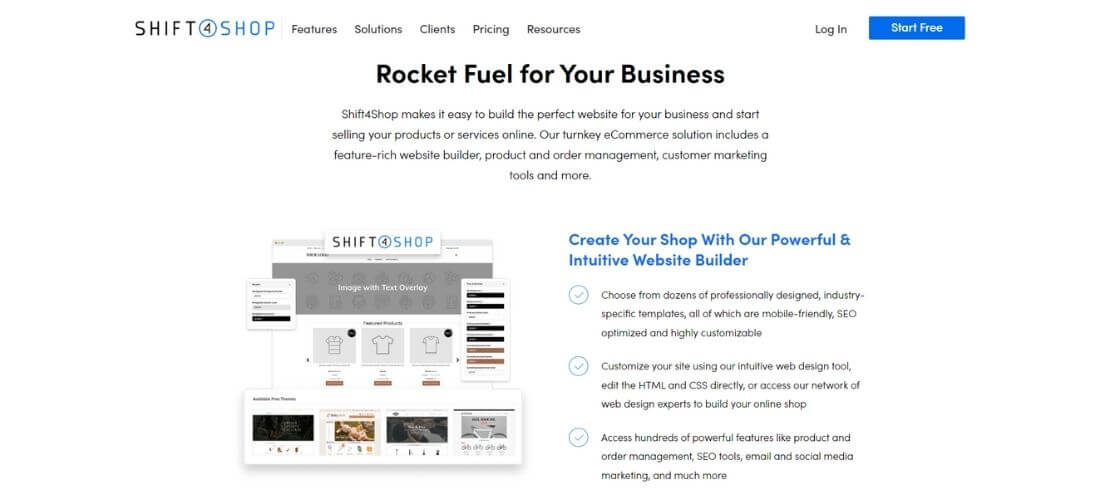
This shopping cart-like platform has plenty of features that make it a great alternative to Shopify.
It provides great scalability for businesses, as they have an option for unlimited storage. What’s more, they have excellent security, which is a top concern for many businesses.
Pros:
- Payment Options – More than 70 different payment gateways available
- No Limit – List as many products as you want for sale
- Fast Speed – Their site works really fast, especially on mobile devices
Cons:
- No Search – No functionality to search for products
- Dated Themes – Ones offered can be consider dated by many
- Expensive to Use – Need to spend a lot to get many of the top features
Pricing: The pricing for Shift4Shop starts at $19 per month and goes all the way up to $229 per month.
Some of the features offered include syncing with Facebook, drop shopping, subscriptions and some SEO tools.
You will choose the level you want to spend based on your budget and the features you need.
Who is this platform perfect for? Shift4Shop is very versatile, which makes it great for businesses that are just starting out selling products online.
It’s great for businesses that also want some design help, as you can pay a fee to have their team design your page for you on their platform.
8. Volusion

More than 200,000 businesses use Volusion for their ecommerce platforms. Hosting is included in this platform, as is all applications that you’ll need to run your store.
The company is based in the UK and has been used by many businesses for years now.
Pros:
- Many Templates – Tons of options for design that all come in templates
- No Fees – No transaction fees added on top of subscription price
- Loads of Options – Amazing selection of options to choose from
Cons:
- Slow to Load – Sites load and operate slow compared to other ecommerce platforms
- Coding Required – Need to have at least base knowledge of coding
- No Search – Not great functionality for visitors to search your site
Pricing: Prices start at $15 per month and go up to $135 per month. The different features and add-ons you select is what will determine your final pricing.
Another thing to note is that if you exceed bandwidth, you will be charged $7 per month for each additional GB you use.
Who is this platform perfect for? Volusion is great for solopreneurs or those just starting out a relatively smaller operation. It’s also a good fit for people who have some decent tech skills as well, since it will take some tinkering.
9. BigCartel
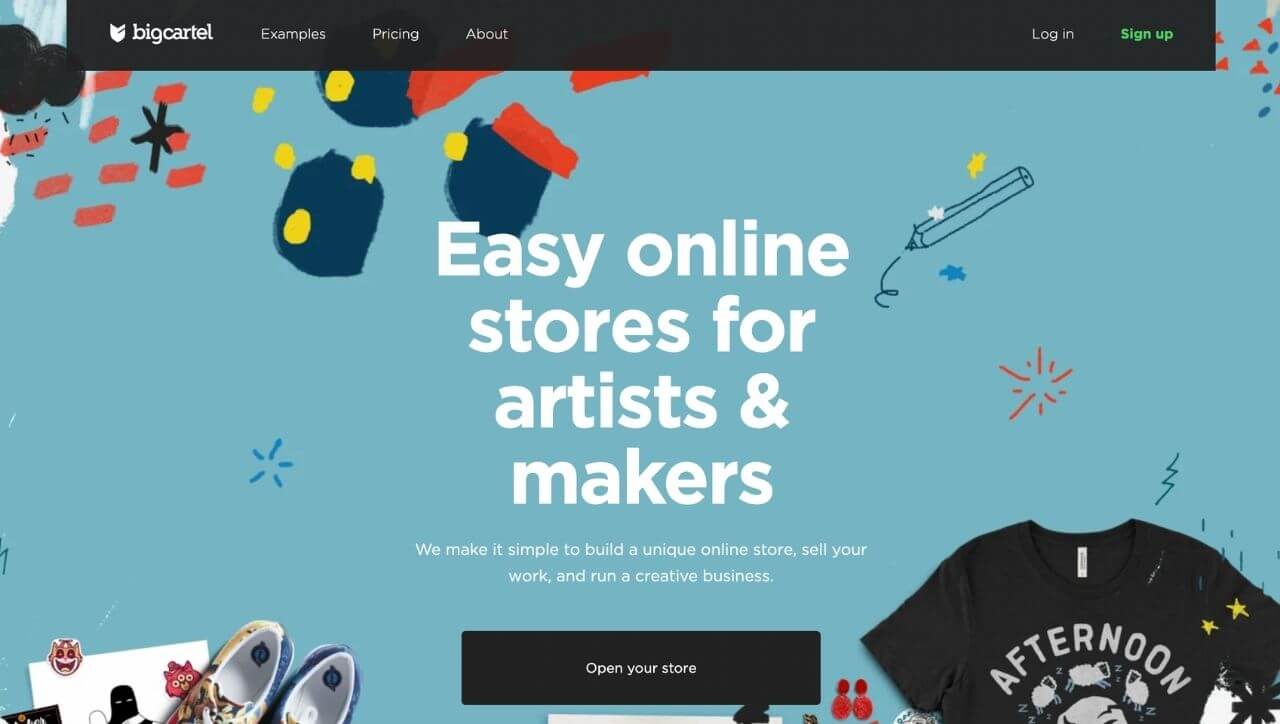
Many artists love this platform for a variety of reasons, but many other people and companies use it as well.
They offer great tracking opportunities for bandwidth and many other exciting features. There are also many other integrated features that make it attractive.
Pros:
- Easy Integration – Including Google Analytics, PayPal and Facebook
- Free to Use – Free plan if you sell less than five products
- Easy to Use – Couldn’t be easier to use
Cons:
- No Support – Can’t receive any phone or chat support from the company
- No Search – Can’t search through the inventory on the site
- Not Catered to Large Businesses – Not a great fit for bigger companies
Pricing: Pricing for BigCartel starts as low as $9.99 per month and can go as high as $29.99 per month. Compared to some other options on this list, that’s quite affordable.
There is a free option, too, which you might consider trying first before diving into one of the paid plans.
Who is this platform perfect for? BigCartel is especially good for makers, artists and businesses that don’t sell a lot of products. These people can even take advantage of the completely free version.
10. Magento
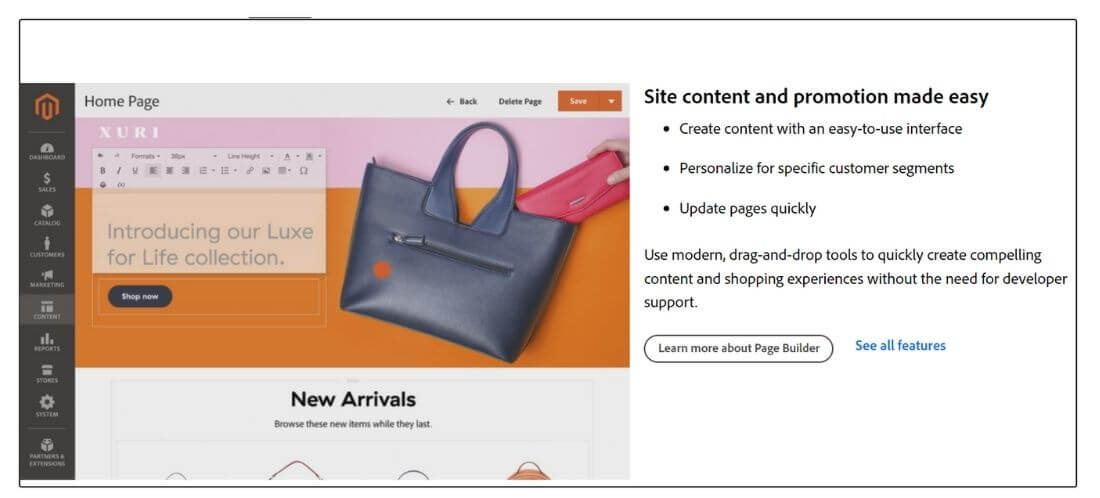
This open-source platform provides unlimited customizations, which helps set it apart from some of the other alternatives to Shopify.
They offer a ton of features, and best of all, it can be free — depending on what you need and what you use. They offer complete control for businesses that use the platform.
Pros:
- No Monthly Charges – No services charges on a monthly basis
- Payment Gateways – Ton of gateway options for payments
- APIs Available – Many available and customizable to your liking
Cons:
- Coding Required – Will need extensive IT skills
- Experience Required – Will need a lot of experience to set up and use properly
- Hosting Required – Will need to add on hosting services to the platform itself
Pricing: There is no monthly pricing for Magento, which means it’s completely free — except not in all cases.
Some developers will want the Enterprise Edition of the program, which can be rather pricey. It can range anywhere from $15,000 per year to $50,000 per year.
Who is this platform perfect for? Magento is really for the experienced company that has developers on their team that can handle the coding, security, setup and integration necessary.
However, if you have this, it’s a really solid option for well-established businesses.
11. Prestashop

Prestashop is a free platform to use, but there are other costs associated with setting up a site there.
It’s a more simplified way to set up an online store than Shopify, which is actually a positive for many people.
There are also some great features that make the platform well worth looking into.
Pros:
- Free to Use – No cost at all to use the ecommerce platform
- Available Internationally – Supports many languages and sales all over the world
- Loads of Features – Plenty of features available even on free version
Cons:
- Limited Choices – Not a lot of choices when it comes to templates and themes
- Coding Required – Will need some coding and technical skills to set up
- Steep Learning Curve – Will have a learning curve to get all set up properly
Pricing: Prestashop is completely free to use, as long as you’re willing to accept the limited resources that they give.
They do offer an upgraded version, though the pricing will depend on what you select.
Also, keep in mind that you’ll have to pay for your own domain and hosting, so it’s not completely free all-in.
Who is this platform perfect for? Prestashop is a great alternative for people who have some technical chops and don’t want to spend a lot of money to get their site all set up.
It’s probably best for small- to mid-sized operations.
12. PinnacleCart
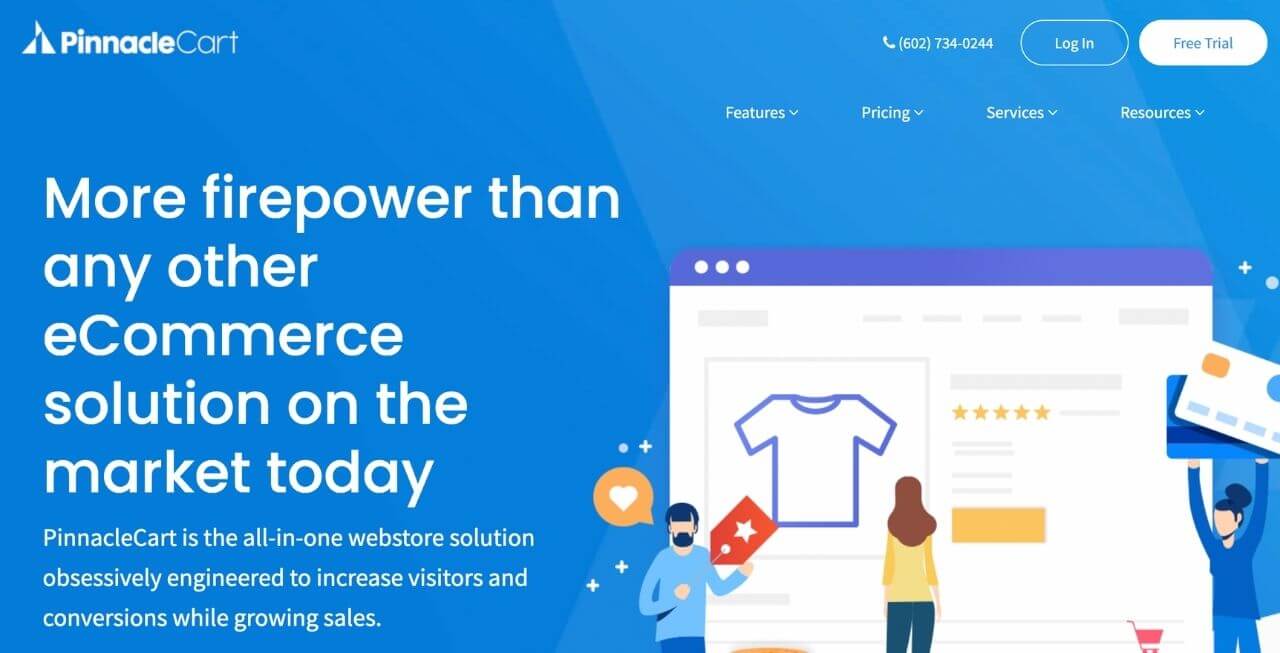
PinnacleCart began in 2003 and was designed with a strong focus integrated for marketing.
This makes it really great for businesses that don’t have that already on their books or in their operations.
This ecommerce platform gives you a lot of control over how your site looks and operates, too.
Pros:
- SEO Features – Feature-rich SEO features that help you get found online
- Limitless Categories – Unlimited categories and products for all plans
- Hosting Choice – Can either have them host or host on your own
Cons:
- Limited Themes – Only 12 available for you to select from
- Must Do Upgrades – Will need to manage all upgrades, since there are multiple versions
- Caps on Storage – Storage and bandwidth caps on all their plans
Pricing: The Standard pricing for PinnacleCart costs $79.95 per month, with the Advanced plan costing $199.95 per month.
Features will increase as you go up to the more expensive plan. They also have an Enterprise plan, but you’ll need to call them for a custom price.
Who is this platform perfect for? Smaller businesses can really benefit from PinnacleCart, especially their integration with marketing features.
These companies often don’t have robust marketing plans or teams, and can benefit from this platform providing it for them.
13. OpenCart
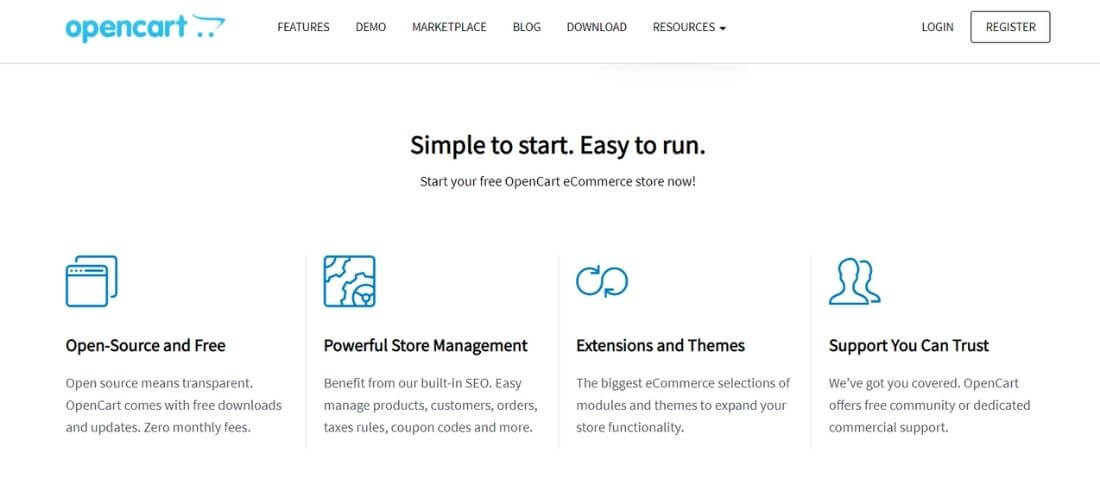
This modern platform gives you the ability to create websites that look very professional, with the ability to customize them to your liking.
It’s an open-source platform for ecommerce, meaning it’s very customizable. And, you can do it all on your own
Pros:
- Flexible Applications – Open-source allows for full customization
- Free to Use – No direct charges on a monthly basis
- Payment Gateways – Plenty of options for payments
Cons:
- Complex and Confusing – Not very easy to set up and use
- Limited Options – While open-source, not as many direct options as Shopify
- Complicated to Learn – Not easy to understand the documentation you’ll need
Pricing: OpenCart is a completely free open-source platform. However, you’ll need to add your own hosting, domain name, emails and more.
They do offer the opportunity to purchase all of that from one of their partners, A2 Hosting.
Who is this platform perfect for? OpenCart is great for a more experienced company, developer or people who have those skills.
Open-source is great, of course, but you’ll need to do some heavy lifting in terms of coding, design, integration and set up.
Wrapping Up
While Shopify is certainly one of the top ecommerce platforms on the market, it’s not the only one that you can use to set up a successful and sustainable ecommerce store.
These Shopify alternatives are a great place to start if you’re looking for more options.
Tim is a classically-trained journalist who loves to share knowledge and information with others. In the past, he has worked in TV, online and print media, and currently works with companies to help design, create and strategize their messaging.






